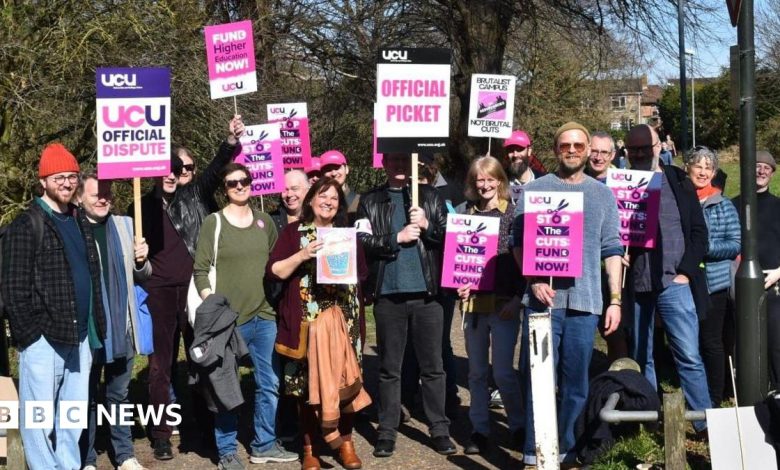University of East Anglia staff strike over redundancies

The University of East Anglia (UEA) is currently facing a crisis that has left its staff and students feeling anxious and uncertain about their futures. The university’s management has announced plans to cut 163 full-time equivalent positions in an effort to save £11m, which has led to a strong reaction from the University and College Union (UCU). The union has decided to take industrial action, which could potentially disrupt the learning experience of students. This decision has been taken to protest against the proposed redundancies, which the union believes will have a devastating impact on the university community. Despite the challenges, the university’s staff are coming together to support each other and fight for their rights, demonstrating the power of collective action in times of crisis.
The current dispute is not an isolated incident, but rather a continuation of a larger struggle that has been ongoing for some time. In 2023, the university cut over 400 posts due to a projected £40m deficit, which had a significant impact on the university’s staff and students. The decision to cut more jobs has been met with resistance from the UCU, which has expressed concerns about the impact of the redundancies on the quality of education and the well-being of staff. The union has also passed a motion of no confidence in the university’s executive team, citing concerns about their handling of the crisis. This lack of confidence in the university’s leadership has created a sense of unease among staff and students, who are worried about the future of the institution.
The university’s management has attempted to reassure students that they will do everything possible to minimize the impact of the industrial action on their learning experience. Prof Emma-Sutton-Pavli, the university’s pro-vice chancellor of student experience and education, has acknowledged that this is a “very stressful” time for students and has promised that the university will make every effort to protect their learning experience. However, the UCU has made it clear that they will not back down without a fight, and the dispute is likely to continue for some time. The university’s staff are determined to defend their jobs and the quality of education, and they are calling on the university’s management to rethink their plans and find alternative solutions to the financial crisis.
The impact of the dispute on students should not be underestimated. Many students are worried about the potential disruption to their studies and are concerned about the impact of the redundancies on the quality of education. The university’s management has assured students that they will do everything possible to minimize the impact of the industrial action, but it is unclear how effective these efforts will be. The UCU has made it clear that they will do everything possible to support students and minimize the impact of the dispute, but the uncertainty and anxiety caused by the situation are likely to persist. The dispute has also raised concerns about the future of higher education and the impact of funding cuts on universities. The UEA is not alone in facing financial challenges, and the dispute has highlighted the need for a more sustainable funding model for higher education.
The decision to take industrial action has not been taken lightly, and the university’s staff are aware of the potential impact on students. However, they believe that the proposed redundancies will have a devastating impact on the university community and that they have no choice but to take a stand. The UCU has made it clear that they are willing to negotiate with the university’s management to find a solution to the crisis, but they will not back down without a fight. The dispute has highlighted the need for a more collaborative approach to decision-making and the importance of listening to the concerns of staff and students. The university’s management must take the concerns of staff and students seriously and work towards finding a solution that benefits everyone.
In conclusion, the dispute at the UEA is a complex and challenging issue that requires a thoughtful and collaborative approach to resolve. The university’s staff and students are coming together to support each other and fight for their rights, and the university’s management must listen to their concerns and work towards finding a solution that benefits everyone. The dispute has highlighted the need for a more sustainable funding model for higher education and the importance of protecting the quality of education. The UCU has made it clear that they will do everything possible to support students and minimize the impact of the dispute, and the university’s management must do the same. Ultimately, the dispute at the UEA is a reminder of the importance of collective action and the need for universities to prioritize the well-being of their staff and students.








